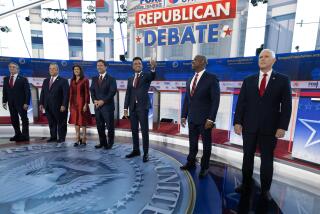Contra Controversy: Back to the Battle
- Share via
WASHINGTON — As major world dramas played out last week, it was unclear whether overworked Administration officials would meet their self-imposed deadline for requesting congressional approval of new economic and military aid for the Nicaraguan contras. But right on schedule, at close of business Tuesday, the plethora of statements, fact sheets and supporting documents that accompany major Administration proposals began arriving in congressional offices. Simultaneously, a “senior Administration official” held a background briefing on the subject for reporters at the White House. This year’s contra fight had begun.
Actually, battle lines were already drawn. “There is a sense of deja vu to all this,” noted one senior State Department official. A similar fight had been waged in Congress over contra aid less than a year ago. In March, 1985, the Administration was soundly defeated in its proposal for military assistance . Economic aid was also rejected, if by a much narrower margin.
However, just days after the vote, Sandinista leader Daniel Ortega helped change congressional minds by visiting Moscow, resplendent in military uniform. The Administration was quick to take advantage and, by June, reversed part of the decision. Congress agreed to provide $27 million in economic aid to the contras. With this program set to expire March 31, the Administration is now seeking $100 million in economic and military aid.
Once again opponents use familiar, if inflammatory, anti- contra rhetoric. House Speaker Thomas P. O’Neill Jr. spoke for a number of Democrats when he warned, “Equipping and sending them into battle will lead to nothing but slaughter and humiliation. The shame of that defeat will bring American troops into Nicaragua.”
Conservative Republicans rose to the bait and denounced the Speaker as the leader of a faction seeking to make contra aid this year’s partisan foreign-policy issue. These Republicans vowed it was “now or never” to aid those fighting the “Marxist-Leninist” Sandinistas. As one self-described White House ideologue put it, “We have to stop the Cubans from trying to kill off the contras. “
Between these extremes, the battle on Capitol Hill will be waged. Since December, senior Administration foreign-policy officials have met repeatedly with key Senate and House moderates in a methodical campaign designed to build support and fashion an acceptable package. White House strategists calculate fewer than 60 swing votes in the 435-member House of Representatives. Rep. Dave McCurdy (D-Okla.), who supports the principle of military aid to the contras , has emerged as spokesman for a pivotal group of some 20 like-minded colleagues, and he has been in regular contact with Administration officials over the past few months. In the Republican-controlled Senate, the White House is assuming key figures will again be the Democrats Sam Nunn of Georgia, Lloyd Bentsen of Texas and David L. Boren of Oklahoma. Last year, they helped offset Republican defections .
Veteran Capitol Hill observers estimate that, as it now stands, the Administration will have a narrow majority in the Senate but be at least 20 votes shy in the House. As a result, everyone expects the Administration to compromise--everyone, that is, except the Administration.
White House officials argue that their aid package addresses the moderates’ concerns. In a time of budget deficits, they note the $100 million is being taken or “reprogrammed” from existing Defense funds. They also argue that the Administration has softened its opposition to negotiations with the Sandinistas.
But congressional moderates say the Administration hasn’t gone far enough along the diplomatic track. One Republican Senate staffer, who supports contra aid, nonetheless asserted, “Elements within the Administration have no interest in the diplomatic process. They just want the Sandinistas overthrown.” This aide predicts that unless there is a credible diplomatic alternative, the Administration could also be in trouble in the Senate.
Another major concern among moderates is the question of who will benefit from the aid. There are myriad competing contra organizations and repeated U.S. attempts to create a united opposition meet with scant success. Critics charge that these contras have shown themselves unable to wage effective war.
But the Administration does not lack ammunition. The Sandinistas, as illustrated by Ortega’s visit to Moscow, can be their own worst enemies. Earlier this month, Ortega was the guest of honor at the Cuban Communist Party Congress, where he declared that relations between Cuba and Nicaragua “are soaked with the blood of Cuban internationalists.” White House officials gleefully repeated this quote. The Administration has also countered the war-scare issue with one of its own. They argue that if the contras fail, a war between Nicaragua and its neighbors is inevitable. From there, they say, U.S. intervention is a small step.
The Admimistration has not yet decided to use the Reagan Doctrine--support for “freedom fighters” worldwide--for the contras . But the White House will make a tentative move in that direction this week, with a message to Congress outlining reasons for support of these groups.
The Administration’s biggest gun is still in reserve. Ronald Reagan, buttressed by events in the Philippines and Haiti, is considered willing, even eager, to step in before the final showdown. Some White House aides are pressing for a televised speech because they believe it is time to use Reagan’s enormous popularity on behalf of a cause dear to the right.
Other aides are not so sure. One insider says that White House pollster Richard B. Wirthlin’s readings show widespread public opposition to increased U.S. involvement: “The public tends to see the contra issue in stark war-and-peace terms.” But even this official concedes that aid to the contras will be seen on Capital Hill as the President’s first major legislative test of the year. With a vote due by the end of March in the Senate and immediately after Easter in the House, the outcome could foreshadow Administration performance on key domestic issues, such as budget cuts and tax reform.
Another staffer cites the “Darman theory,” named after Richard G. Darman, deputy to James A. Baker III, who is widely admired for his legislative strategy. “Darman always argued that it was essential to win,” he said, “because, once you lose, your opponents become more aggressive and it takes a lot more to win the next time around.”
Meanwhile, State Department officials are pressing for a continuation of the campaign of one-on-one lobbying with members of Congress. But such a campaign presupposes a disposition toward compromise, a condition not yet present, and demands an Administration that speaks with one voice. This White House team, led by Chief of Staff Donald T. Regan, misses on both counts. Last year’s principals on the contra issue, National Security Adviser Robert C. McFarlane and White House chief lobbyist Max L. Friedersdorf, are gone--replaced by men lacking their ability and, more important, their authority to make deals on the Hill.
Instead, there is Regan, who may not even think in terms of horse-trading. “I can’t imagine Regan cutting a last-minute deal with Boren,” said one Administration insider. “Deals happen all around Regan,” this official added, “It was Baker and Darman last year on tax reform, perhaps it will be (George P.) Shultz and (Elliott) Abrams this time around.”
More to Read
Sign up for Essential California
The most important California stories and recommendations in your inbox every morning.
You may occasionally receive promotional content from the Los Angeles Times.












